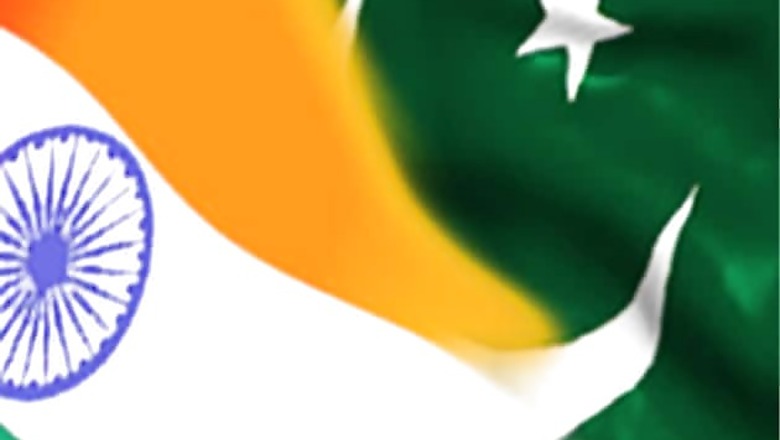
views
The Opposition has been riling the Centre for being inactive and indecisive in the face of aggression from across the LoC that claimed five soldiers' lives. However, isn't this a chance when politicians should close their ranks and put up a united front? National Security Advisory Board member and foreign editor of Hindustan Times Pramit Pal Chaudhuri joined IBNLive readers for an interaction on the issue.
Q. Today in Parliament our politicians did put up a united front against the Poonch LoC killings; but what this unity is for? Is it for any good of Indo-Pak relations or only for Congress to save its face in light of looming general elections next year. Congress did stand with opposition today when the Defence Minister took a complete U-Turn in his assessment of the incidents. One wonder what material evidence has made the Terrorists in Pak army uniform from terrorists to the Army itself. But my question is what good this united front will serve. This rare unity b/w Congress n Opposition seems to be actually driven by Election compulsions and Populist Appeasement policy, which has potential to derail the CBMs. Asked by: Raja Debashis
A. I think that AK Anthony's adoption of the Indian Army's earlier release citing the Pakistan Army was probably driven by a short-term electoral calculation. To some degree, the real division shown up in the past few days has been the one between Prime Minister Manmohan Singh's government and the Congress Party. I would argue that in the bigger picture there is actually little difference between the Congress and BJP on Pakistan. Compare Atal Bihari Vajpayee and Singh: what exactly was the difference between the two prime ministers when it came to Pakistan?
Q. Why can't we learn from Mahabharata? Shri Krishna tried everything to have peace with Kauravas but the Kauravas never wanted peace. in the end war was the only option left. Asked by: internet hindu
A. I'm not completely sure what lesson should be drawn here. But if I've understood you correctly, then the Indian government is doing exactly what Sri Krishna did. Namely, attempt to find a negotiated settlement as long as it is feasible to do so. When all peaceful avenues fail, then go for a hard option.
Q. The time for our politicians to come united has gone, the politics in the nation have became such that one party doesn't want to take action on the neighbouring enemy nations keeping in mind the votes of a particular community, if another party pressurises the govt to take action then it will say that the party is always against that community, and ministers say that people join army and police just to die... this is the political situation in our country ... the approach should be if u hit once we will hit twice. Asked by: Nomula Vinod
A. I will try to draw a question from your statement. Is there a consensus among our political leadership about the use of force against a threat to the nation? In a direct invasion, yes -- consider the unanimity shown during the Kargil war. But when it come to covert operations, assassination, cross-border raiding, or other forceful retaliation below the threshold of war. There is no consensus on this for a variety of reasons.
Q. Why till now our prime minister has not said a single word about this incident? Is there no value for a life of a soldier or what? What is the motive behind the politicians who openly tell that soldiers are meant to be martyred? Asked by: Girish Kalagond
A. I would hope that the Prime Minister will make a statement. As he is determined to meet Nawaz Sharif in September, he should make a statement the logic of why he is doing so despite what is happening in Kashmir. But he usually does so at the end of the parliamentary session, so we will have to see.
Q. Seldom do we witness unanimity between the our leaders and representatives (ruling and opposition) on any issue even if it concerns matter of national security and Territorial integrity. It appears that there certain things in this world that never ever transforms and one of them is agreement between our leaders? Do you foresee any possible change in this trend in the coming days? Asked by: Tanveer Md Masood
A. I would argue there is broad unanimity between the two national parties on the big picture of national security -- relations with Pakistan, China, the US and most of our smaller neighbours. There are differences, however, on the tactical means to pursue such relations. And there is a lack of coherence on our Tier B foreign policy interests like trade, Africa, Southeast Asia, etc. Unfortunately, even this minimal consensus tends to fray at least rhetorically during election time. Will this change? Almost certainly. The United States used to bitterly fight within itself on foreign policy for most of its history. It was the 30 year period covering the two World Wars that created the country's foreign policy "establishment" that continues to set the agenda to this day.
Q. I believe BJP had rightly opposed Antony for his bizarre statement giving clean chit to Pakistan army?Your take on this? Asked by: Ankit
A. If the Indian Army had not issued a differing statement just before Anthony spoke, no one could really accuse him of giving a clean chit. It is the change in language between the two -- and the fact Singh's desire to continue the dialogue with Pakistan -- that makes Anthony's statement suspicious. Presumably the army statement was based on some empirical evidence about Pakistani Army involvement. If not, then the Army is at fault. If so, then someone in the political system is to blame. The sole survivor of the ambush would presumably be the person to question. Noticeably the media has not been given any access to him.
Q. The problem with our nation is that whenever such incidents happen(would continue..) everybody starts giving opinions,good or bad, but the end result is nil.This time too we are pretty sure that we wont retaliate, we would keep on talking big things, and there would be some bigwig compensations for the bereaved families, while politics would continue everywhere.Then there would be some new incident and we would forget it. We don't expect anything from our politicians (read urchins). They are all wolves in sheep masks. Asked by: Sourya
A. That we Indians like to debate everything is not necessarily a bad thing. But I agree that it should be followed up with some action. Unfortunately UPA 2 has somehow lost the ability to implement its own policies, on every front.
Q. Has the 'soft' option worked in dealing with Pakistan? If one cannot learn from past mistakes then, one should question the wisdom of politicians and leave Pakistan to the army and let them deal with it? Asked by: Playfair
A. India cannot let its military be outside civilian control. Not even our army would want that. The best policy tends to be one that combines both carrot and stick. The proper mix of soft and hard has tended to get the best results. An example would be Musharraf who came to office a bitter enemy of India, concluded the cost of hostilities was too high for Pakistan, and then sought a peace settlement that would have given up Pakistan's claim to Kashmir. But it was a mix of diplomacy, military threats and persuading the US to help us that produced this change.
Q. If the opposition had the exact information, what were they doing with it. It is absolutely nonsensical on the part of opposition to score points at such juncture. Did the government of the day know that such and such attach is going to happen? They have made an absolute spectacle of the situation and we have become a laughing stock? Also, the media, I think the craze for Durga Shakti Nagpal, seems to be over, innocent children killed in food poisoning case is a thing of past, now for days together we will be fed with the Indo-Pak diatribe, all the ex-Foreign Secretaries will be on the channel and nothing would emerge. This is indeed an opportunity to come together, but look what will happen today, yesterday many of the BJP leaders ran to Patna and already have started complaining that none of the JDU ministers were present at the Airport. Just getting sick of this drama, Why can't the entire Parliament come together, the way they came to protect themselves from RTI, and issue a strong statement against Pakistan or endorse military action against Pakistan. Asked by: S ESHWAR
A. You are absolutely right to say it is impossible for anyone to predict something like a border raid or ambush. Hundreds of such incidents happen on India's borders with both Pakistan and China every year. My sense was that it was the discrepancy between the Indian Army statement and Anthony's parliamentary statement that gave the opposition the opportunity it needed. The US Congress passes dozens of non-binding "sense of the house" resolutions every year. Curiously, India's parliament does not have as strong a tradition of doing so. There may be a legal reason why this is so, or it may just be that we are still to fractious. I am not sure.
Q. Is there a specific reason for UPA 2 being soft on LOC incursion, involving killing of our Jawans? Do doubts persist on the location of incidents - across the LOC, near the LOC, on the LOC? Asked by: sundar1950in
A. The LoC, upto the Siachen glacier, is clearly demarcated and recorded with the United Nations. Since the 2003 ceasefire there has been a dramatic drop in the number of incidents along the LoC. Before the ceasefire, we would lose 400 to 600 soldiers a year. This became so routine, we barely paid any attention. This fell to between 10 and 20 a year -- sometimes less. LoC incidents, infiltration and attacks inside Kashmir have all begun to rise the past two years. I wouldn't claim the UPA is soft. But I would argue that it doesn't have a coherent response to what seems to be a shift in Pakistan's policy, a shift back to the pre-2003 position.
Q. Americans bombard with drones as well as funds in Pakistan and Pakistan respects them with fear. Is there a need to show might to make Pakistan understand our view point? Asked by: sundar1950in
A. The best policy in regards to Pakistan is always a mix of carrot and stick. A purely military response is self-defeating, but so is one based only on diplomacy and concessions. We have used military threats before and, in 2002, we even carried out an airstrike on an incursion. The real question is whether the mix is being handled right.
Q. The foreign policy at Pakistan keeps on changing with every new regime, alternating between Army and civilian rule. Will there be a continuity of agreements, if it happens? Asked by: sundar1950in
A. Actually, it is relatively consistent because the civilians have no real say in foreign policy. The military has been consistent but change when the circumstances force them to. Thus the Pakistan army put Kashmir on the back burner because of the US presence in Afghanistan. Now the US is leaving, so Kashmir is back on the agenda.
Q. Is our Government not spending a quality time on mending fences with our neighbours? Bangladesh, Srilanka, Nepal, China, Maladives, and eVen Bhutan have issues with us. Which ministry is attending on this to sort out matters in a time frame? Asked by: sundar1950in
A. Actually we have done good work with our neighbours the past few years. The problem has been the intervention of regional parties. Trinamool blocked what would have been a historical pact with Bangladesh, sorting out all of our outstanding problems. The Tamil parties have made our Sri Lanka policy difficult. Nepal is frozen -- because its domestic politics is gridlocked. Myanmar is about countering Chinese economic presence, but our economy is on the ropes right now.
Q. Rightly said in the RS, today the opposition had only pointed out errors of UPA 2. The unity in relation to the commitment to the country is not suspect either of the ruling or opposition party.Why is this missed in media? Asked by: sundar1950in
A. But notice how Prime Minister Singh and Vajpayee had almost identical policies towards Pakistan? Ignore terrorist provocations and pursue the peace process as much as possible.
Q. After two successive defeats in war, Pak came at Kargil and then off and on incursions and incidents on LOC. It is no secret that the neighbours hand exists on the terror attack inside the country. Why no proactive action from UPA 2. Even the reaction are slow. Asked by: sundar1950in
A. No one, even overseas, denies that Pakistan's military uses terror as an instrument against India. The issue is what to do about it? Pakistan is nuclear armed with a population larger than Russia's. The goal therefore is to make the military realise that this will not change India's stance, will damage Pakistan and discredit the army at home. Not easy.
Q. Just because we are ruled by different parties for a particular period foreign policies keep changing. But should we compromise of issues relating to lives of jawans? Can't there be a secular thought and a unified law which could be implemented to strike the enemy in spite of who governs the country? Asked by: suresh
A. Military retaliation is not feasible in a nuclear weapons environment because of the issue of escalation -- there is a consensus on this. India also aspires to be recognised in the coming decades as a responsible great power, Pakistan doesn't mind being a rogue nation. There is no consensus at home on assassination, covert ops and other lesser actions. This means the military option remains severely circumscribed.



















Comments
0 comment